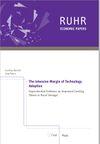Evidence on Impacts and Adoption in GIZ Cookstove Interventions
Introduction
A range of rigorous evaluations has been conducted by RWI on improved cookstoves interventions supported by GIZ. In cooperation with local national and international research partners like University of Passau, RWI studied the impacts of improved biomass cookstoves on people’s livelihoods in terms of socio-economics, health and the environment. In addition, the research looked into drivers and barriers of adoption of these stoves.
The Intensive Margin of Technology Adoption – Experimental Evidence on Improved Cooking Stoves in Rural Senegal
Abstract
Today, almost 3 billion people in developing countries rely on biomass as primary cooking fuel, with profound negative implications for their well-being. Improved biomass cooking stoves are alleged to counteract these adverse effects. This paper evaluates take-up and impacts of low-cost improved stoves through a randomized controlled trial. The randomized stove is primarily designed to curb firewood consumption, but not smoke emissions. Nonetheless, we find considerable effects not only on firewood consumption, but also on smoke exposure and, consequently, smoke-related disease symptoms. The reduced smoke exposure results from behavioural changes in terms of increased outside cooking and a reduction in cooking time. We conclude that in order to assess the effectiveness of a technology-oriented intervention, it is critical to not only account for the incidence of technology adoption – the extensive margin – but also for the way the new technology is used – the intensive margin.
Reference
Bensch, G. and J. Peters (2015), The Intensive Margin of Technology Adoption - Experimental Evidence on Improved Cooking Stoves in rural Senegal. Journal of Health Economics 42, 44-63. RWI. (Journal article, access to this document is restricted)
Bensch, G. and J. Peters (2014), The Intensive Margin of Technology Adoption - Experimental Evidence on Improved Cooking Stoves in rural Senegal. Ruhr Economic Papers #494. RWI. (open access Working Paper version)
Why do Households Forego High Returns from Technology Adoption - Evidence from Improved Cookstoves in Burkina Faso
Abstract
Around 3 billion people in developing countries rely on woodfuels for their daily cooking needs with profound negative implications for their workload, health, and budget as well as the environment. Improved cooking stove (ICS) technologies appear to be an obvious solution in many cases. In spite of great efforts made by the international community to disseminate ICSs, take-up rates in most developing countries are strikingly low. In this paper, we examine the reasons for (non-)adoption of a very simple ICS in urban Burkina Faso. As a first result, we find that ICS users need between 20 and 30 percent less firewood compared to traditional stoves, making the investment a very profitable one. Nonetheless, adoption rates are a mere 10 percent. The major deterrent to adoption is the upfront investment costs, which are much more important than access to information, taste preferences, or the woman’s role in the household. These findings suggest that more direct promotion strategies such as subsidies would help households to overcome liquidity constraints, and would hence improve adoption rates.
Reference
Bensch, G., M. Grimm and J. Peters (2015), Why do households forego high returns from technology adoption? Evidence from improved cooking stoves in Burkina Faso. Journal of Economic Behavior & Organization 116, 187-205. (Journal article, access to this document is restricted)
Bensch, G., M. Grimm and J. Peters (2014), Why do households forego high returns from technology adoption - evidence from improved cook stoves in Burkina Faso. Ruhr Economic Papers #498. RWI. (open access Working Paper version)
Alleviating Deforestation Pressures? Impacts of Improved Stove Dissemination on Charcoal Consumption in Urban Senegal
Abstract
With around 40 percent of the world population relying on woodfuels for cooking in developing countries, the dissemination of improved cooking stoves (ICS) is frequently considered an effective instrument to combat deforestation, particularly in arid countries. This paper evaluates the impacts of an ICS dissemination project in urban Senegal on charcoal consumption using data collected among 624 households. The virtue of our data is that it allows for rigorously estimating charcoal savings by accounting for both household characteristics and meal-specific cooking patterns. We find average savings of 25% per dish. In total, the intervention reduces Senegalese charcoal consumption by around one percent.
Reference
Bensch, G. and J. Peters (2013), Alleviating deforestation pressures? Impacts of improved stove dissemination on charcoal consumption in urban Senegal. Land Economics 89 (4): 676-698. (Journal article, access to this document is restricted)





















